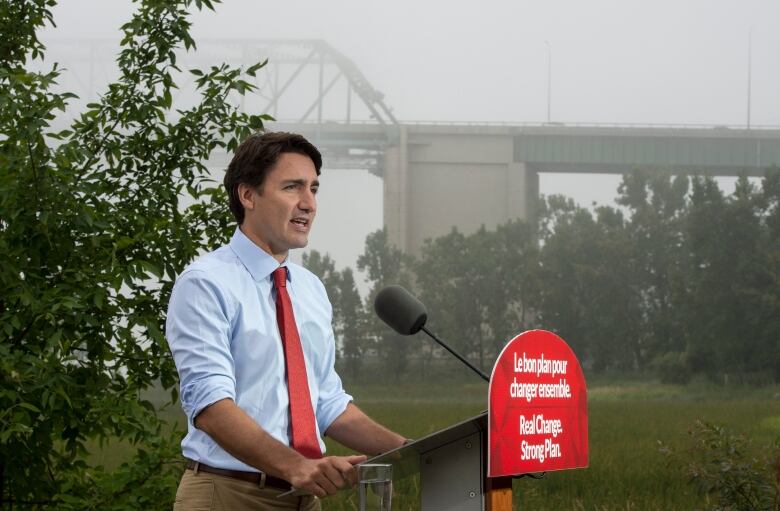Harper pledges enhanced tax credit for northern mining projects
Canada's resource sector has taken major hit from plummeting commodities prices
A re-elected Conservative government would continue to provide tax credits aimed at encouraging mineral exploration, particularly in northern communities, party leader Stephen Harper announced today.
Speaking to a group of supporters in North Bay, Ont., Harper said the 15 per cent Mineral Exploration Tax Credit — created in 2006 — would be extended for at least another three years if he returns as prime minister.
He added that an enhanced credit would be offered to proposed projects facing steep overhead costs due to remote locations and distance from transportation routes. Projects like the Ring of Fire in northern Ontario or Plan Nord in Quebec would qualify for the 25 per cent tax credit.
- Canada in recession as GDP shrinks in second quarter
- How a recession would shake up the election campaign
- Recession? Knowing if we're in one matters: Don Pittis
- Jason Kenney touts broader definition of 'recession'
The total cost of the extended credit and the enhanced one would be $60 million a year beginning in 2016-17.
"Having riches below the ground does not in and of itself guarantee prosperity above," Harper said, stressing the need to move ahead with resource development projects that face considerable logistical challenges.
Once Harper had finished speaking, a locally-known environmental activist, Jan Roberts, stood up from his seat near the podium and took off his flannel shirt, revealing an undershirt emblazoned with the words "Water not Harper."
He was escorted from Harper's immediate vicinity by RMCP officers, and then a Conservative Party staffer walked him out of the building.
"They are putting more security protection into themselves and their campaign stops than they are into the environment," Roberts told reporters outside, adding he has concerns about proposed pipeline projects.

Roberts said he had no intention of disrupting the event, or approaching Harper directly.
"They may have read that as something more escalating than it was. It was more cautious and safe to just stand there and let the three words speak for themselves."
Key riding
It's not a coincidence that Harper made the announcement in North Bay, a community with deep connections to the mining industry in Canada.
A press release that accompanied Harper's speech cited statistics from a study commissioned by the City of North Bay that found 65 local businesses are directly involved in the mining supply and services industry. The sector, according to the same study, employs 3,000 people in the city.

North Bay is also a part of Nipissing–Timiskaming, a riding being watched carefully by all three major parties because it's the kind of battleground that on election night could paint an accurate picture about the staying power of the Conservatives, the life left in the Liberals, the depth of any NDP surge and whether strategic voting is really a thing.
Conservative Jay Aspin beat incumbent Liberal Anthony Rota by only 18 votes in 2011, the smallest margin in the country. Rota is running a rematch.
The NDP, meanwhile, posted some of its strongest numbers ever in the riding in 2011, hitting 21 per cent in an area that has always gone either blue or red. When the New Democrats talk about this election, they throw Nipissing–Timiskaming onto their list of "maybes."
Kathleen Jodouin, a victims' rights advocate and co-ordinator of the Women and HIV/AIDS Initiative in the North Bay area, is running for the NDP this time.
All this means that vote splits and the potential for strategic voting are top of mind for the candidates.
Resource sector decline
Harper's announcement Wednesday comes one day after Statistics Canada confirmed that Canada fell into a recession in the first half of the year. The economic contraction was spurred in large party by a significant drop in oil prices, though prices for commodities, including metals and minerals, are down across the board.
The Statistics Canada report also found exports of metal ores and non-metallic minerals were down 7.9 per cent in the second quarter of this year.

The decline in the resource sector has been especially difficult for North Bay and other communities in Nipissing–Timiskaming.
The Conservative leader took the opportunity to slam his chief political rivals for what he said were irresponsible attacks on Canada's mining industry.
Both Liberal Leader Justin Trudeau and NDP Leader Tom Mulcair oppose the Mining Exploration Tax Credit — another indication, Harper said, that their plans for stimulating the stalling economy will not work.
Trudeau was campaigning in Trois-Rivieres, Que., on Wednesday, where he re-announced his party's plan to invest $6 billion over four years in green energy and jobs.
Mulcair was in Kamloops, B.C., where he pledged $28 million in new funding for programs promoting team sports and physical activity for children. The money will be focused on underrepresented groups like girls and young women, new Canadians, and indigenous, LGBT and disabled youth, Mulcair said.
Corrections
- This story has been updated from an earlier version that incorrectly stated Howard Hampton is the NDP candidate in Nipissing-Timiskaming. In fact, the party's candidate is Kathleen Jodouin.Sep 02, 2015 4:06 PM ET
With files from The Canadian Press and James Cudmore
